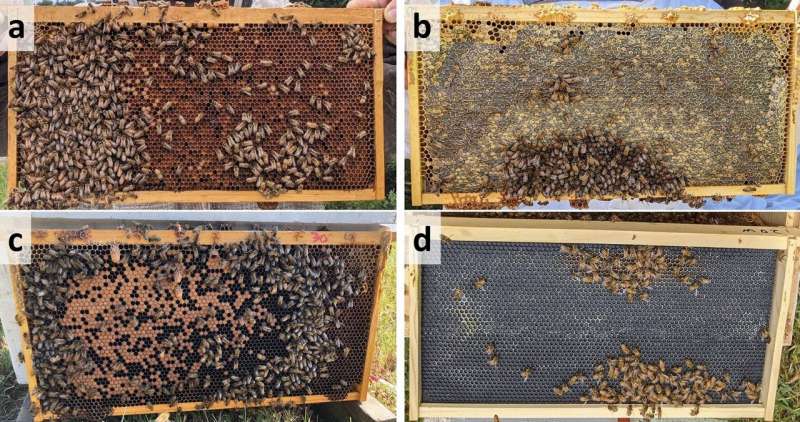
As pollinators of flowers, trees and more than 50 crops, whereby they add an estimated $34 billion per year to the U.S. economy, honey bees offer value both ecological and economic—even before accounting for their signature product.
In pollinating agricultural fields, though, honey bees can encounter pesticides meant for others but harmful and sometimes lethal to them. Research suggests that those pesticides have contributed to the widespread and widely publicized collapse of honey bee colonies over the past decade-plus. The emergence of pesticide-treated seeds, which are no longer subject to regulation after leaving the factory, may be exacerbating the issue.
Beekeepers looking to establish new colonies will commonly reuse the comb and food stores of failed predecessors, including those constructed by honey bees exposed to pesticides. Wondering about the potential effects and viability of the practice, Nebraska’s Judy Wu-Smart, Autumn Smart and Rogan Tokach decided to run an experiment.
The trio established two groups of small colonies. Those in the control group were supplied with pollen and honey from pesticide-free colonies, while others borrowed resources from colonies that perished after exposure to pesticides that impair honey bee development, functioning and fertility.
In both cases, each new colony was devoid of a queen, which normally ranks as the lone sexually mature female and, as such, is crucial to the propagation and sustainability of a colony. Whereas control-group colonies produced an average of 5.9 queen cells—those housing and nurturing queen candidates—the colonies relying on pesticide-contaminated food stores managed an average of just 3.2.
The non-contaminated colonies were also much more successful at rearing healthy virgins, which must mate with several males before becoming viable queens: 83.9% of those colonies produced mating, egg-laying queens, compared with only 32.6% of their contaminated counterparts. The findings are published in the journal Scientific Reports.
Unlike prior research, which found pesticide-related effects on queen production after exposing colonies to the chemicals for a month or more, the Husker team’s study suggests that even short-term, limited exposure can curb queen-rearing.
Whether the observed effects would persist in larger colonies, which can sometimes dilute contaminants to the point of minimizing their harm, is one of several questions worth investigating, the team said.
In the meantime, the researchers recommended that beekeepers perform necropsies to determine the causes of colony loss and avoid reusing resources that come from colonies exposed to pesticides. Beekeepers can also monitor the performance of new colonies—keeping an eye out for signs of disease, among other telltales—to help discern whether reused food stores or equipment should be removed.
More information:
Rogan Tokach et al, Re-using food resources from failed honey bee (Apis mellifera L.) colonies and their impact on colony queen rearing capacity, Scientific Reports (2023). DOI: 10.1038/s41598-023-44037-2
Citation:
Reusing failed bee colony resources may curb rearing of queens (2024, February 21)
retrieved 21 February 2024
from https://phys.org/news/2024-02-reusing-bee-colony-resources-curb.html
This document is subject to copyright. Apart from any fair dealing for the purpose of private study or research, no
part may be reproduced without the written permission. The content is provided for information purposes only.







